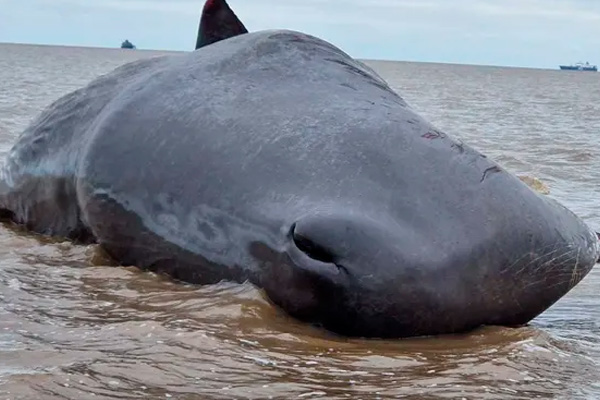Friday at noon, it was reported that a whale was in distress, but marine rescue service arrived too late to save it.
It is believed that a sperm whale that washed up on the coast of Lincolnshire has perished.
British Divers Marine Life Rescue (BDMLR) was contacted around 12:15 p.m. on Good Friday to assist with a “large beached cetacean” on Cleethorpes’s beach. The organisation reported that the whale was observed “upright in the water” around noon, but by the time it reached the shore, it was on its side.
The enormous whale was captured on social media in shallow water just off the coast.
A spokesperson for the BDMLR stated, “HM Coastguard and the Cleethorpes beach safety team were able to provide photographs that helped us positively identify the individual and keep the public secure in a potentially hazardous area.”
“Unfortunately, as the tide was rising rapidly, there was no way for BDMLR personnel to access the whale safely, and it shortly submerged.
The beach safety team was able to display our medical staff CCTV footage of the whale before it sank, and it appeared to have died.
The charity stated that it believed the whale to be male because “female sperm whales are extremely rare this far north, with the last one recorded in the UK in 2016.”
Sperm whales are the largest toothed whales, attaining lengths of up to 16 metres, and can hold their breath for up to 120 minutes while diving for gigantic squid.
The charity reported that “there have been numerous North Sea beachings over the years.” “It appears that these animals wind up outside of their natural habitat in these relatively shallow waters, where they struggle to feed and find their way back out, becoming malnourished and disoriented.”
Unfortunately, by the time they strand, if they are still surviving, they are frequently in poor health.
The incident has been reported to the Cetacean Stranding Investigation Programme (CSIP), which is funded by the Department for Environment, Food, and Rural Affairs and the devolved administrations.
The BDMLR spokesperson added, “Although the whale’s position is likely to change over the next few hours, it is conceivable that it will reappear at the next low tide.”
It is imperative that people stay away from the bodies of dead marine mammals because the cause of their stranding is unknown and disease cannot be ruled out.






